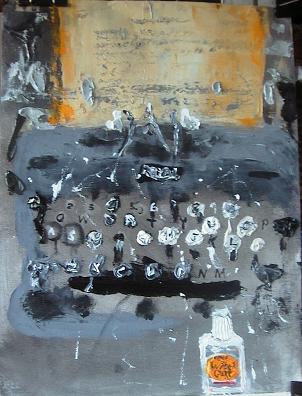You Never Confide Anything in Monday Movies, So We Have to Extrapolate
Barcelona — Mrs. K-sky and I blew off our families, got on a plane, and spent Thanksgiving and the following week drowning our jet lag in small plates of small fish in the Catalonian capital. She’d never seen anything by Whit Stillman, so we queued up his 1994 sophomore effort for the flight back.
In high school and college, I’d loved Metropolitan and Barcelona (Last Days of Disco less so; recently, Damsels in Distress was a pleasant but underwhelming return) and I was a little nervous about going back to them. Without question, the movie holds up.
Ted and Fred Boynton are fractious cousins living together in Barcelona at the end of the cold war. Ted (Taylor Nichols) runs a sales office for a corporation whose purposes are so generic they approach Platonic forms; between Dale Carnegie, Glenn Miller and the Bible, he theorizes himself a Boy Scout’s life of rectitude, spooling out a plan to abandon the distracting pursuit of trade-fair-girl pulchritude in favor of “plain or homely girls.” Fred (Stillman’s muse Chris Eigeman) is an advance man for and passionate defender of the U.S. Navy.
Despite their immaculately wordy debates, the two function as a recognizable comic pair, even classical: hapless Ted and thin-skinned bullying barnacle Fred. Paired off with local girls (Mira Sorvino and Tushka Bergen, fondly bewildered), they splash through a wave of anti-Americanism. As practically religious emissaries for American capitalism and militarism, they pout and protest as they draw the ire (and fire) of their hosts.
It’s said that Woody Allen showed just how far Brooklyn was from Manhattan, creating in Alvy Singer and his other fictional substitutes a figure who was always traveling towards the center while gripping tight his baggage from the periphery. Paradoxically, even though Stillman’s figures represent the WASP power structure, his success — the reason his bald conservatism is never sour or reactionary — comes from giving his “urban haute bourgeois” (as Metropolitan put it) characters some of this same marginal quality. They lash out at the modern world, but their bafflement and insecurity takes the place of that resentment holds among their more politically oriented relatives.
There’s no question that Barcelona’s heart is with Ted, Fred and America. The men of Barcelona are deluded, angry leftists. Stillman doesn’t stint on their arsenal — I can’t imagine another movie that would reference George Meaney and labor imperialism with the old epithet the “AFL-CIA” — but they misfire it (they think it’s an actual union; of course, Fred doesn’t know whether or not it is, and, sublimely, Ted points out that it should technically be the AF of L-CIA). The cousins’ ultimate imperial victory is total, even classical: having triumphantly spirited away their Catalonian beauties to a Midwestern lakeside, they show them the makings of a proper American hamburger.
December 4, 2012 - Posted by Josh K-sky | Monday Movies | Barcelona, Chris Eigeman, Whit Stillman, Woody Allen
1 Comment
Sorry, the comment form is closed at this time.
Recent Comments
- adkriefall on Middlemarch Post #2 (Book One: Miss Brooke): Throwing Victorian Shade
- poc2666 on Middlemarch quotes
- poc2666 on Middlemarch quotes
- poc2666 on Middlemarch quotes
- poc2666 on Middlemarch quotes
- poc2666 on Middlemarch quotes
- Josh K-sky on Middlemarch Post #2 (Book One: Miss Brooke): Throwing Victorian Shade
- Josh K-sky on Middlemarch Post #2 (Book One: Miss Brooke): Throwing Victorian Shade
- adkriefall on Middlemarch Post #2 (Book One: Miss Brooke): Throwing Victorian Shade
- adkriefall on Middlemarch Post #2 (Book One: Miss Brooke): Throwing Victorian Shade
-
Recent Posts
- Middlemarch Post #2 (Book One: Miss Brooke): Throwing Victorian Shade
- Middlemarch quotes
- Am I afraid of the (anti-)epic journey ahead of us?
- Summer Reading Club: The Master and Margarita
- When I Grow Up I Want to Be an Old Woman
- Noble Monsters
- The Flamethrowers, a reader response
- Yumyum! Gothic Late Modernism
- Pushing back the schedule/ I so know Donoso
- José Donoso, The Obscene Bird of Night (1970): Reading Schedule
Categories
- 2666
- academia
- Awkwardness (the book)
- Blagojevich
- books
- bookstores
- boredom
- C
- Chicago
- comic books!!!
- David Foster Wallace
- Death Notice
- dreams
- economics
- family values
- Fernando Pessoa
- film
- Friday Afternoon Confessional
- Fundraising
- housekeeping
- IMs
- innovative technologies that shape our lives
- insomnia
- instant messaging
- language
- language acquisition
- life of the mind
- media
- meta
- Monday Movies
- moving
- Music
- observational humor
- politics
- Pre-Wordpress Posts
- public transit
- race
- religion
- Roman Empire
- shameless self-promotion
- Small Talk About the Weather
- Solidarity
- Spoiler Alert Thursdays
- squalor
- Sunday Stories
- syntax
- teaching
- television
- The Flame Alphabet
- the science of dating
- Thursday Take Down
- torture
- Tuesday Hatred
- Tuesday Quought
- Valentine's Day
- waking up in a cold sweat
- Wednesday Food
- Wednesday Workshop
- Wittgenstein
- Zizek and Theology
Archives
 Adam’s Shared Items
Adam’s Shared Items- An error has occurred; the feed is probably down. Try again later.
Our motto:
"Get a job -- and some human rights!"Closely-related sites
An und für sich: an academic blog covering philosophy, theology, literature, and politics Mammoth and Mastodon: a webcomic, updated regularlyBlog Stats
- 628,266 pageviews
Feeds et al.

I saw 21 Jump Street. I don’t think anybody involved with that film read Kierkegaard’s take on comic effect.
Comment by Guido Nius | December 9, 2012